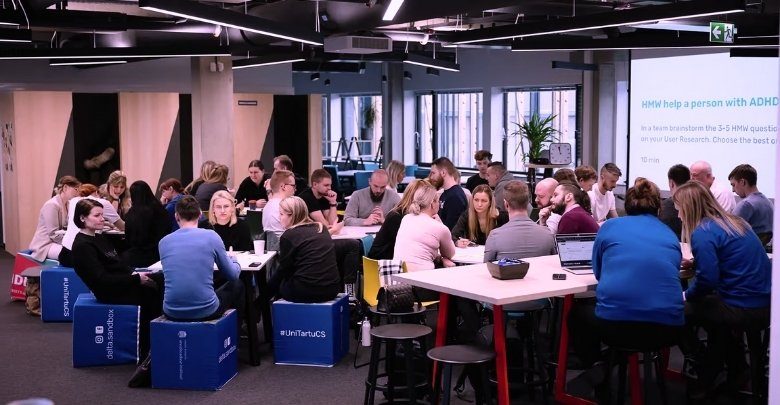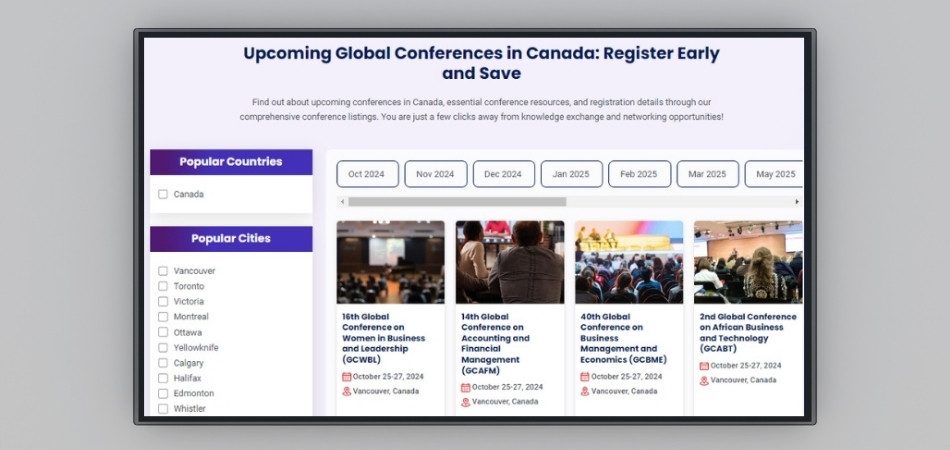You can boost your career, widen your network, and learn about new ideas by attending the right conference. It’s a key move for gaining knowledge, making valuable contacts, and showcasing your expertise.
Choosing a conference that aligns with your goals is essential for achieving these benefits. However, choosing a conference requires knowing how to search for upcoming conferences shortly.
To search for upcoming conferences, use specialized websites like Global Conference Alliance Inc., explore social media channels and professional networks, subscribe to industry newsletters, and follow announcements from relevant professional associations to stay updated.
Continue reading for more insights and tips on choosing the best conference to advance your professional journey.
Why Attending Conferences is Important for Your Career?
There are many benefits to attending conferences that aren’t always obvious, and they can change the course of your career. It’s not just about the breakout sessions and keynote speakers; it’s about the ripple effect of being there. The importance of these conferences for professional development is explained below.

Expanding Your Network
Conferences bring together like-minded professionals from various industries and regions. This setting allows you to meet new people, which can lead to job opportunities and collaborations. Engaging with experts and peers also provides you with insights and advice that are not readily available online. Through these connections, your professional network becomes a valuable resource for career advancement.
Learning Industry Trends and Innovations
Staying updated with the latest trends is crucial in any field. Conferences often showcase innovations, new tools, and strategies before they hit the mainstream market.
Presentations and workshops provide a detailed insight into upcoming changes and advancements. You return to your job equipped with knowledge that can improve your performance and efficiency.
Amplifying Your Skills
Interactive workshops and seminars are a staple at conferences designed to refine your skills. They offer hands-on experience and the chance to ask questions directly to the experts. This learning environment is specifically designed to boost your confidence and competence in new areas. Applying these improved skills can set you apart from your colleagues back home.
Gaining Visibility
Participating actively in conferences can raise your profile within your professional community. By attending, speaking, or even volunteering, you make yourself more visible to influencers and leaders. This visibility can lead to recognition and respect, which are invaluable for career progression. Your active presence can make you a go-to person in your field, opening doors to more opportunities.
Conferences are more than just an educational experience; they are a catalyst for professional development and opportunities. By stepping out of your daily routine and entering a space filled with potential, you unlock doors to advancements that could shape the trajectory of your career. Keep these points in mind as you consider upcoming conferences to attend—it might just be the turning point you’re looking for.
How to Search for Upcoming Conferences?
You can further your professional development by finding the right conference that offers networking opportunities, learning opportunities, and growth opportunities. With numerous events occurring globally, it’s essential to have a methodical approach to identify those that best suit your interests and career goals. Here is a step-by-step guide for finding upcoming conferences.
Step 1: Start with Specialized Websites
Begin your search on dedicated conference organizers, such as Global Conference Alliance Inc. These websites categorize events by industry, location, and date, making finding the right upcoming conferences to attend easily as you browse through numerous options. Regularly visiting these sites ensures you stay informed about new announcements and early bird registration deadlines. This proactive approach keeps you ahead in the professional circle.
Step 2: Utilize Networking and Social Media
Use your professional networks and social media channels to hear about upcoming conferences. Many organizations announce their events on platforms like LinkedIn, Twitter, and even Facebook. Following key industry leaders and influencers can also lead you to discover gatherings they endorse or attend. Social media not only updates you about events but also about the buzz surrounding them.
Step 3: Subscribe to Industry Newsletters
Many industry groups and professional associations send out newsletters that include information about upcoming conferences. By subscribing to these emails, you ensure that you receive timely updates directly to your inbox. These newsletters often offer exclusive discounts or special registration privileges to their subscribers. Staying subscribed helps you maintain a pulse on relevant events without constantly searching.
Step 4: Check with Professional Associations
Finding the right conference isn’t just about enhancing knowledge; it’s a strategic move for advancing your career. By following these steps, you can efficiently find upcoming conferences that align with your professional goals and interests. Keep exploring, stay informed, and use these strategies to unlock the full potential of your industry’s conference circuit. You will achieve greater success with each event you attend.
What to Consider When Choosing a Conference to Attend?
Your choice of conference can play a significant role in your professional life, providing numerous opportunities for growth, learning, and networking. With countless options available, it’s important to select an event that aligns with your career objectives and personal interests. Here’s how to get through the process and make an informed decision:
Relevance to Your Field
Ensure the conference topics are directly related to your area of expertise or interest. When finding upcoming conferences, this alignment guarantees that the content will be beneficial and applicable to your work. It’s also wise to look for events that challenge and expand your current knowledge. A relevant conference can provide fresh insights that you can immediately apply to your professional tasks.
Networking Opportunities
Consider the networking potential of the conference. Check who else is attending: peers, industry leaders, potential mentors, or collaborators. Events that attract a diverse group of professionals offer better opportunities for meaningful connections. These relationships can lead to collaborations, job opportunities, and valuable exchanges of ideas.
Quality of Speakers
The quality of speakers can greatly enhance the conference experience. Look for events featuring respected and renowned experts in your field. These speakers often share innovative insights and real-world applications of new theories and practices. Attending sessions with high-quality speakers can be incredibly inspiring and educational.
Location and Cost
Evaluate the logistical aspects like location and cost. A conveniently located conference can reduce travel expenses and time away from work or family. Consider also the registration fee, accommodation costs, and any potential sponsorships or financial aid options available. Balancing cost with the potential benefits is crucial for justifying the investment. Once you’ve considered these factors, finding upcoming conferences that meet your criteria will be much easier.
Tips to Help You Get the Most Out of the Conference You Will Attend
Taking part in a conference can be an exciting and enriching experience, offering a mix of learning, networking, and growth. The key to maximizing these opportunities is to approach the event strategically, starting with how you find upcoming conferences and sufficient preparation. Here are practical tips to help you make the most of any conference you attend.
- Plan Your Schedule: Review the conference program early to identify key sessions that align with your goals. This preparation ensures you get all the presentations that could be crucial for your development.
- Engage Actively in Sessions: Don’t just listen passively; participate in discussions and ask questions to deepen your understanding. Engaging actively will enrich your experience and make the sessions more memorable.
- Utilize Networking Opportunities: Make a point to introduce yourself to new people every day. Networking isn’t just about exchanging business cards; it’s about building lasting professional relationships.
- Take Notes Effectively: Jot down insights and ideas that resonate with you during the talks. Effective note-taking can help you better remember and apply what you learn.
- Follow-Up Post-Conference: Send emails to the contacts you’ve made, expressing your appreciation for the interaction. Following up can turn a brief meeting into a long-term professional connection.
- Reflect on Your Learnings: After the conference, review your notes and identify key takeaways to implement in your work. Reflecting helps solidify your learning and ensures actionable outcomes.
Making the most of a conference goes beyond just showing up; it involves active participation and strategic planning. These tips will not only enhance your conference experience but also help you translate the insights and connections you gain into tangible career benefits.
Frequently Asked Questions (FAQs)
Searching for upcoming conferences can seem overwhelming with so many options out there. Here are some frequently asked questions with concise answers to help you efficiently find conferences that will benefit your professional growth.
Where Can I Find a List of Upcoming Conferences?
Check specialized conference listing websites like Global Conference Alliance Inc., which categorize events by industry, location, and date, making it easy to find relevant gatherings. Some platforms also provide options to filter by virtual or hybrid formats. Regularly browsing these sites ensures you don’t miss early registration discounts or important deadlines.
How Do I Know if a Conference is Reputable?
Research past events from the organizer, read reviews from attendees, and check the caliber of previous speakers to gauge the conference’s reputation and quality. Look for media coverage or partnerships with recognized organizations as indicators of credibility. If available, explore attendee feedback on networking opportunities and content relevance.
Can I Find Industry-Specific Conferences?
Yes, many conference websites allow you to search for events based on specific industries such as tech, marketing, or healthcare, ensuring you find the most relevant ones. Some sites also offer curated lists or recommendations specific to your field. Additionally, professional associations often host niche events for targeted audiences.
How Early Should I Start Looking for Conferences?
Start searching at least 6 months in advance, especially for popular conferences, as this will give you enough time to arrange travel and accommodation, and often get early bird rates. Early planning also helps secure spots in limited-capacity workshops or exclusive networking events. Some conferences even offer instalment payment options for early registrants.
Is There a Way to Find out About the Latest Conferences?
Subscribe to newsletters from conference organizers and industry groups, and follow relevant hashtags and influencers on social media to receive updates on the latest conference announcements. Many organizations announce events first through their online communities or mailing lists. Attending webinars and virtual meetups can also provide leads on upcoming conferences.
Closing Remarks
Stepping into the world of professional development involves more than just excelling at your job; it’s about actively engaging in opportunities that expand your knowledge and network. Conferences serve as a crucial platform for this, providing insights from top industry experts and a chance to connect with peers.
Knowing how to search for upcoming conferences positions you to select the most relevant events strategically. This careful selection ensures every conference you attend directly contributes to your career goals, turning each opportunity into a stepping stone toward greater achievements. Keep this approach in mind as you plan your next educational endeavor.







